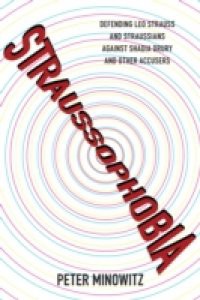Leo Strauss and his students have long been accused of mendacity, elitism, and militarism, but the Iraq War has prompted unprecedented levels of caustic and inaccurate denunciations. Inappropriate criticisms have issued from artists (Tim Robbins), politicians (Ron Paul), journalists (Joe Klein), and even highly lauded scholars such as Arthur Schlesinger, Jr., Gordon Wood, Douglas Massey, Stephen Holmes, Anne Norton, Shadia Drury, Sheldon Wolin, John Pocock, John Yolton, Nicholas Xenos, and Brian Leiter. In Straussophobia, Peter Minowitz provides a methodical and detailed critique of the major offenders, especially of Drury, who maintains that Strauss established a 'covert tyranny' that would keep the Western world 'mired in perpetual war.' In replying to such charges_and to various authors who belittle Strauss's contributions as a scholar_Minowitz highlights the imaginative yet meticulous manner in which Strauss interpreted Thucydides, Plato, Xenophon, Farabi, Machiavelli, Hobbes, Locke, and Carl Schmitt. Straussophobia also provides both a comprehensive assessment of Strauss's 1933 letter that commended 'fascist, authoritarian, and imperial' principles, and a compelling account of Strauss's influence, or lack of influence, on neoconservative promoters of the Iraq War (e.g., Paul Wolfowitz, Richard Perle, and Lewis Libby). The book likewise breaks new ground in employing diversity discourse to explain and combat the bigotry and buffoonery that pervade attacks against Strauss and Straussians_and in drawing on Strauss to illuminate the distortions that mar some widely-used arguments for affirmative action.

